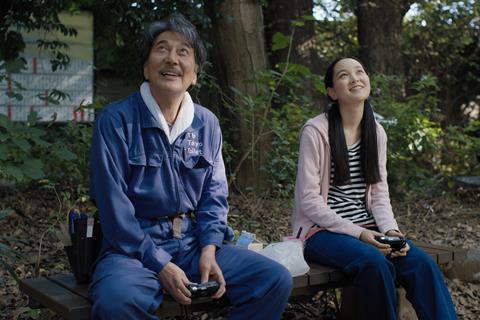Wim Wenders returns to Cannes competition with this meditative tale of a man living a quiet existence in Tokyo

Dir. Wim Wenders. 2023. Japan. 124mins
Japan has previously brought Wim Wenders inspiration, in 1980s documentaries Tokyo-Ga and Notebook On Cities And Clothes. Now, the German veteran returns to Tokyo to reinvent his fiction film-making (and, to some degree, retrieve his mojo) in Perfect Days, a likeable, elegantly crafted drift that might superficially seem as close as they come to being the proverbial ‘movie about nothing’. In fact, this is a philosophical contemplation that is very much about something – a meaning-of-life film, no less – with an introverted, immensely likeable central performance from Koji Yakusho. Wenders’ Cannes Competition entry is likely to be his most commercial fiction in some time, despite being unapologetically an art-house miniature. Yet it’s hard to escape a certain preciousness that is likely to turn off viewers with harder-edged tastes.
Likely to be Wenders’ most commercial fiction in some time, despite being unapologetically an art-house miniature.
This is a film about a solitary man – Hirayama, a toilet cleaner in late middle age, played by Japanese cinema mainstay Yakusho, who won the Best Actor prize at Cannes. A low-height Ozu-style shot at the start shows Hirayama waking in his sparse flat before he shaves, trims his moustache, sprays his houseplants and dons the blue overalls of Tokyo Toilets, the company he works for. Much of the film shows Hirayama cheerfully and meticulously going about his work, sometimes accompanied by his erratic young assistant Takashi (an abrasively goofy comic performance by Tokio Emoto) and listening to pop cassettes as he drives his van. In between, we see the uneventful but contented flow of his days: relaxing in a bathhouse; eating in various bars, where he eavesdrops with amusement on customers’ banter; reading William Faulkner; and taking photos of the world around him with an old-fashioned film camera.
The taciturn Hirayama barely speaks throughout – Takashi rates him “9 out of 10 on the weirdness scale” – but he is no discontented recluse, simply someone who appears at ease in a world that he is alertly aware of. He does not need to socialise but seems happy enough when he comes into contact with people; like a small boy he rescues, and Mama (Sayuri Ishikawa), a middle-aged woman who runs a noodle bar he frequents. It’s only later in the film, when he is visited by teenage niece Niko (Arisa Nakano), that we get some glimmer of his background, with the suggestion that he has cut himself off from his roots.
In fact, another relative expresses shock that Hirayama is working as a toilet cleaner – which might hint at a life-choice trajectory akin to the Jack Nicholson character in Five Easy Pieces. But the job itself isn’t at all represented as menial drudgery, and what another film might have depicted as a lonely, meaningless existence here comes across as very meaningful and quietly rich. (Among recent films, the closest affinity in subject and tone might be Jim Jarmusch’s Paterson). As well as a sensitive, spiritually-attuned observer of the world, Hirayama is a perfectionist who takes pleasure in leaving his conveniences immaculately tended (admittedly, Wenders skews the picture by having him only tend to Tokyo’s shiniest, most architecturally appealing loos, like the one with glass walls that turn magically opaque at the turn of a doorknob).
When Hirayama goes to sleep, we see his dreams; semi-abstract superimposition montages in black and white (the director’s wife Donata Wenders is credited with ‘dream installations’). An end title explaining the Japanese concept of komorebi (roughly, the dappled shadows of leaves) wraps up some key themes, although perhaps too explicitly after Hirayama’s playful encounter with a melancholy divorced man (Tomokazu Miura, from Takeshi Kitano’s Outrage films, among others).
The film is liberally punctuated with music, primarily 60s pop, but it’s surprising that Wenders, always noted as a jukebox connoisseur, should have opted here for such a clichéd Golden Greats selection – Nina Simone, Van Morrison, ‘House of the Rising Sun’ (also sung by Ishikawa in a Japanese version), even Lou Reed’s ‘Perfect Day’, making the title connection a touch obvious. By contrast, welcome exceptions include Patti Smith’s ‘Redondo Beach’ and the Rolling Stones rarity ‘(Walkin’ Through The) Sleepy City’.
Very much in the film’s favour are its lazy drift, its refusal of restrictive narrative shape and its restless exploration of Tokyo, with Franz Lustig’s photography luminous by light and day. Some familiar Wenders references are here (notably a nod to Patricia Highsmith’s fiction), while the Ozu influence is inevitably present – although the overall tone is closer to latterday reference points like Hirokazu Kore-eda, in his softer mode, and Naomi Kawase’s delicately feelgood Sweet Bean. An extended shot of an ambiguously smiling Hirayama is a closing grace note but, for all its poetic charm, this is a slender work that comes across as something of a ’mindfulness movie’, in a faintly self-satisfied vein.
Production companies: MASTER MIND Ltd., Spoon Inc., Wenders Images
International sales: The Match Factory sales@matchfactory.de
Producer: Koji Yanai
Screenplay: Wim Wenders, Takuma Takasaki
Cinematography: Franz Lustig
Editor: Toni Froschhammer
Production design: Towako Kuwajima
Main cast: Koji Yakusho, Tokio Emoto, Arisa Nakano, Aoi Yamada, Sayuri Ishikawa, Tomokazu Miura






![The Brightest SunScreen[Courtesy HKIFF]](https://d1nslcd7m2225b.cloudfront.net/Pictures/274x183/3/5/0/1448350_thebrightestsunscreencourtesyhkiff_312678.jpg)















![The Brightest SunScreen[Courtesy HKIFF]](https://d1nslcd7m2225b.cloudfront.net/Pictures/100x67/3/5/0/1448350_thebrightestsunscreencourtesyhkiff_312678.jpg)

